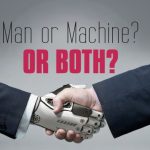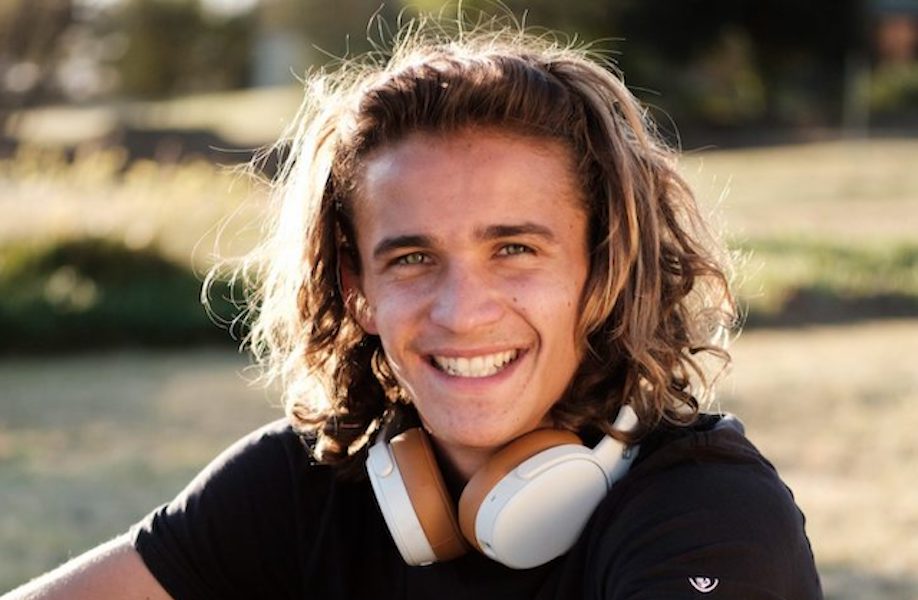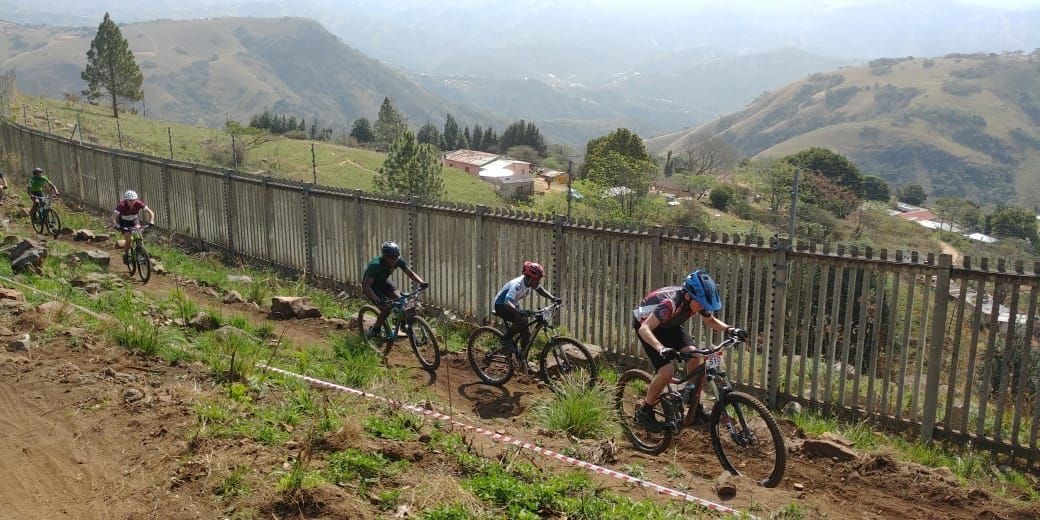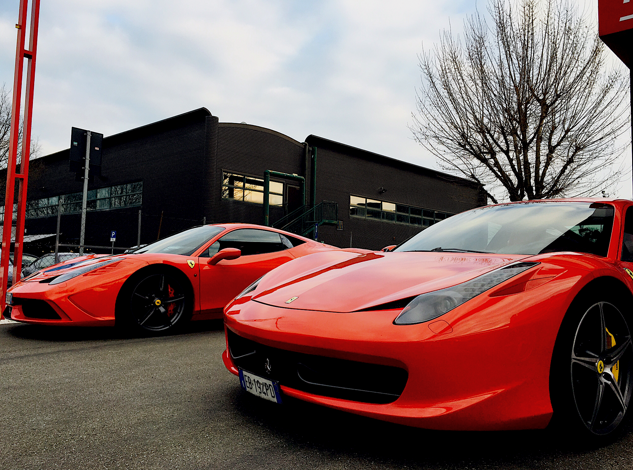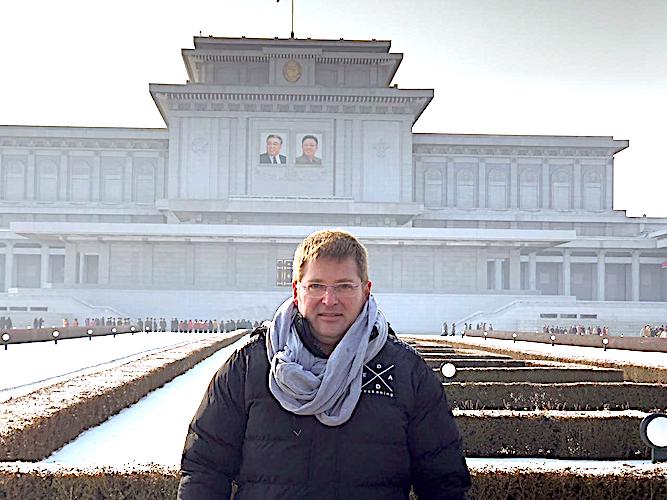
North Korea: a state of paradox
We toasted to long life. Me with water, as February is the month I have chosen to give up alcohol (much harder than January’s social media and, I predict, March’s animal products) and the rest of the group – barring our older Danish friend who would later tell me in a taxi in Pyongyang as we left the others at a local bar and headed to our hotel and $7 coffee that he’s not had a drink for five years after a lifetime of too much booze – with the local North Korean clear spirits.
The toast was led by Paul. Slightly balding on top, a bit of a curly mullet in the neck with highlights. Pretty much always in shorts during our trip, including when temperatures dip below ten degrees Celsius. From the United Kingdom. With a strong accent that some may frown upon. And, if ever I needed a reminder not to judge a book by its cover, Paul was it. Extremely knowledgeable about cricket – and much else besides. A worldly traveller. Generous to a fault. Engaging and inclusive. A real mensch.
We are in the most isolated place on earth. And, many would argue, one of the most dangerous: North Korea. It has long been a dream of mine to visit this country I, and many others, know so little about. And here I finally was. With my mate and CN&CO partner Rob, a couple of Poms (ranging from a vocal Brexit supporter to Australian dating, dental hygienist Ben and his brother Matt, with whom I shared lekker liberal debates about the state of world politics), a Canadian living in London after completing her Masters at Cambridge, Norwegian and Danish father and son combos, tattooed Scott from Scotland, an Australian living in the UAE and working for the Louvre (widower of a South African – you can’t make this stuff up) and the Germans (tall Marcel who tells me I am more German than he is, owing to my ancestry) and his artistic, sketching-as-we-progress-along-the-train tracks girlfriend, Frederica. A motley crew and one composed of people I developed a real interest in and fondness of – despite our short time together.
Our tour operator Lupine Travel is based in Wiggin in the UK and well-known for “out-of-the-ordinary” trips. I’d highly recommend them. Value for money. Safe. Efficient. Quality (in fact, already scoping a trip for 2020 when I turn 45 and will need to get some excitement back in my middle-aged bones before they become complacent).
With the diversity of our group, I wonder to myself what it is that we share. Surely there must be something that has brought us together to this place. Perhaps a shared sense of (extreme) adventure coupled with a frisson of danger? A desire to go where so few have gone? A need to expose ourselves, harshly, to challenges and learn more about the stereotypical view most of us have of the Democratic People’s Republic of Korea, led by the Supreme Leader Kim Jong Un? And maybe just because we can.
Our arrival in Pyongyang
Over the course of our five days together being minded by the North Korean Travel Company employees and the broader State apparatus, I come to think that the link we have is the knowledge that travel broadens the mind, shatters long-held beliefs, creates memories and forges unlikely friendships. And that, for sure, is good enough for me.
Grey is increasingly my favourite colour. Because there are so many shades of it. Not basic black. Nor extreme white. But the full range in between these two colours that makes life so very interesting. One of the greatest gifts of getting older is that increasing realisation that life is not a linear path. That things are never just one thing. Not right or wrong. Not merely one reality.
I sometimes need to remind myself of my Masters thesis which explored the various realities of our existence – using Nobel laureate Harold Pinter’s screenplays as my canvas. And North Korea brings this view of the world harshly into focus. Right between the eyes. And via a powerful punch to the gut. Most useful when, like me, you are evaluating your role in the world – the meaning of (your) life – to get these reminders.
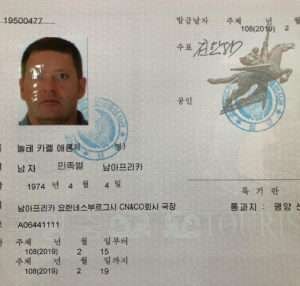 Travel in North Korea is heavily restricted and severely controlled by the authorities. Only about 3 500 visas are issued a year and many (most?) of these to Chinese nationals. Your visa is a loose, beautiful, document that is given at the border (applied for by Lupine on your behalf) and taken back at the end. No stamp is put in your passport. No record in your travel documents that you were there. You are advised to take a photo of it as a momentum. Of course, I got a tremendous kick out of CN&CO featuring on this visa. Way more of a kick than I did when Kurt Solomon was written on my Lebanese visa as my official Leb minder! I did struggle though to come up with my “title” – chief señor may stress the Supreme Leader … so I settled for co-founder.
Travel in North Korea is heavily restricted and severely controlled by the authorities. Only about 3 500 visas are issued a year and many (most?) of these to Chinese nationals. Your visa is a loose, beautiful, document that is given at the border (applied for by Lupine on your behalf) and taken back at the end. No stamp is put in your passport. No record in your travel documents that you were there. You are advised to take a photo of it as a momentum. Of course, I got a tremendous kick out of CN&CO featuring on this visa. Way more of a kick than I did when Kurt Solomon was written on my Lebanese visa as my official Leb minder! I did struggle though to come up with my “title” – chief señor may stress the Supreme Leader … so I settled for co-founder.
Lupine provides a Chinese guide who meets you at Dandong, the Chinese city on the North Korean border. This guide stays with you during your trip. Our guide’s English name is Michelle and she fulfilled her role extremely well. Efficient, sweet and rather shy, in an endearing Chinese way, Michelle works with the North Korean appointed guides during the trip and made sure we were well taken care of throughout out visit.
Mrs Kang and Mrs So were our given North Korean guides. Their official role was to explain much of the way of life in this enigmatic country (which they did really well), to answer any of our questions (again they did a great job here), to ensure our safety (we lived to tell the tale!) and to show us the best of North Korea (big tick). However, they are also expected to prevent us from going off on our own. By taking our passports in the beginning of the trip, by restricting any engagement with locals except on official visits and by ensuring that we didn’t veer off the prepared itinerary, these two employees of the state (everyone in this country is given employment by the socialist state) did a good job of keeping us on the straight and narrow.
Having your movements restricted can be frustrating. For me this was one of many paradoxes of this tour. Knowing that there is great effort to only show you the best of the country (not unlike other countries) but also a concerted effort to hide anything that may be perceived as negative. Bizarre as, clearly, every country has its challenges – and part of what I love about travelling is learning about these and understanding how much most of us have in common in trying to overcome these hardships. If you aren’t prepared to deal with this paradox and are so set in your views of the world that you cannot see merit in a different way of doing something (even one you may disagree with strongly) don’t bother visiting – you’ll never be able to filter the propaganda and find some learnings and enjoyment.
Mrs So singing us the North Korean national anthem on the bus
Before entering North Korea I was scared – not a feeling I often have on trips. With the visit book-ended by stop in big, vibrant, developing cities Beijing and Shanghai, North Korea is a throwback to the past. It reminded me a lot of my trip in the mid-nineties to Eastern Europe – where Sarajevo was still marred by sporadic sniper violence, where I enjoyed Prague without the take-away joints and Western shops that followed not long after and where Christmas Day in Bucharest was an exercise in tracking down a decent bottle of wine and a hearty meal before capitalism exploded. North Korea happily reminded me of travel days gone by where I used real maps, got paper invoices, got lost, had to plan long in advance, paid with cash hidden in socks – the days before technology made everything so much simpler (worse?) and countries became more vanilla. Again a paradox I mulled over a lot during this trip. The double-edged sword of progress.
You are warned not to take in anything “political”, “religious” or pornographic. Nor anything overtly pro-American, pro-South Korean or anti North Korean (most of that was quite easy for me – although I did take easy reading books rather than more stimulating non-fiction on leadership and economics – just to be on the safe side!)
You are also told that you can’t take photos in many places, that you must not try to smuggle any local currency out (difficult anyway as you only get some local currency under controlled circumstances when you are allowed to go, under supervision, to a supermarket to buy some local food; Marthie is getting North Korean spices – I think at least that’s what I bought!)
You’re also warned that foreigners are monitored and listening apparatus used. For someone who is outspoken and not fond of being told what to do and not to do, this was something I had to get my head around upfront. And during the trip, whilst what we saw and did was heavily controlled, I never felt intruded upon or unsafe.
Customs just over the Chinese border takes about two hours. And you stay on the train. Same on the way out. Both times the guards and officials were uber efficient – and friendly. One or two even cracked a smile. But just as you relaxed, another would bark at you. A strange mix throughout the trip of hectic autocratic bureaucracy and a rather sweet (yes, really) near joy at life.
Since visitors are also warned that there may be consequences for guides and locals if you write negative (or perceived negative) comments, I will limit my blog to a few observations that may be of interest – more in detail when we meet face-to-face.
Birthday celebrations
Our visit purposefully coincided with the birthday celebrations of the current Supreme Leader’s dad, Our Dear Father Kim Jong Il, who died in 2011. Images of both him and his father, General Kim Il Sung, are everywhere – on pins of the military, on the sides of buildings, at all official offices – everywhere. Not unlike the images of the Bhutan royal family displayed everywhere in that little country, but still rather freaky.
Mass dancing in celebration of the Supreme Leader’s birthday
During birthday celebrations and the official two-day public holiday, all North Korean citizens pay their respects. Formally and in public. All of them. One way to do so (and which we did) is to visit the Kumsusan Palace of the Sun (pictured in the header image) where the man lies, embalmed, in state.
This visit was truly a highlight. You have to dress up. Not only no jeans, but the smarter the better. So I dutifully donned black trousers and a Pink shirt. The day was bitterly cold (minus 11 at the start) but lots of sunshine. Beautiful really. Upon arrival there is security. And you wait in a formal waiting room where the tone is hushed. Then you are lined up in rows of four, outside. You start walking. No joking and minimal talking. You enter the massive building. And by massive, I mean, massive. You climb stairs in your row of four. You ride escalators and travelators. You walk along corridors. You pass generals. Many. Hundreds, upon hundreds (one was a woman). None smiled. Nor spoke. All here to pay their respects.
‘Danny Boy’ Pyongyang-style – guests and waitresses provide the music
The surrealism of it all. I am in North Korea. Nuclear North Korea. With all these generals. Acknowledging the former leader’s birthday. Remarkable. You go past large, framed photos. And portraits. All extolling the virtue of the three leaders – granddad General Kim Il Sung, dad Kim Jong Il and the current Supreme Leader Kim Jong Un. He of Donald Trump summit fame.
You bow before the huge wax statues of the two dead ones. In your row of four. Your guide stifles a sob of heartache for the loss. And then you enter the dimmed room where the small body of our Dear Father Kim Jong Il lies. You bow at his feet. At his left side. At his right side. Your mind is a range of emotions. And then you walk, climb and ride all the way back. Into the biting cold, the sunshine, the photo before the palace. Where, you are reminded, you must not take a photo that cuts off any part of the leaders. All photos must contain the full statue. The full portrait. Be respectful. In this country which is all about equality and the good of all, remember to respect the three great leaders. A paradox I struggled with throughout – and one I wonder how the locals reconcile. I wasn’t comfortable ever asking Mrs Kang.

Paying respects on Mansun Hill
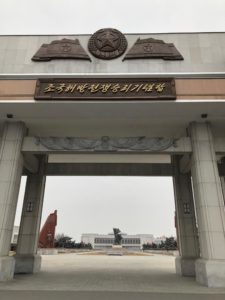
The Military Museum
The international gift village
Part of our itinerary included a visit to the international gift village. Rooms and rooms of gifts given to the three leaders. I was rather proud that South Africa’s only contribution was a weather-beaten ANC flag from the 90’s and a tacky (well, actually, bloody ugly, poorly painted) ostrich egg – with a crack. Other countries and organisations have donated some pretty impressive gifts – the Russians of course strong contenders for being most generous. And I loved the shooter glass-presenting, upright-standing, stuffed crocodile from I can’t remember where (maybe Venezuela?) But if you ever wonder what to get me as a special gift…. #justsaying
One of many interesting parts to this visit was that we not only bowed to the wax statues of the leaders but also to one of the grandmother of the current leader. She died aged 32, allegedly as her earlier life was tough fighting as a guerrilla. She still gets gifts sent to her we were told. And in a book I skim-read about her, I enjoyed her telling her son in winter – you can’t have warm clothing. At your age, your dad had nothing. Go play in the snow and identify with the people you will lead. Not sure the time-line gels but an interesting take on her parenting. And another paradox with her son dying years later on his luxurious private train with his Apple Mac on the desk and feet massage roller under the carved desk. The society is still heavily patriarchal – women must get a husband. And give birth. And do “womanly” things. To have value. Of course, they must also be the equal of men in working the fields. Socialism. Equality. Must get married and have children.

The food was incredible throughout our visit
Museumolology
North Korea can teach the world a thing or two about museums. The one glorifying their victory in the 1950-1953 war is spectacular – the architecture, the plush, beautiful interior which reminded me more of a classy Las Vegas casino, the good coffee post the video stop to learn who really started the war unprovoked (America) and the hall upon hall of well preserved, brilliantly presented exhibitions. The subject matter may not be our cup of tea, but the university can offer a course on museumology (what IS the word for that?!).
Music
From the minute you descend the train in Pyongyang (after a 14-hour overnight train journey from Beijing, a two-hour border search and another six-hour North Korean train through pretty desolate winter scenery no less) you are greeted by rousing music that reminded me of the South African National Party in the 1960s, the Nazi party of the 1930s and what was played endlessly in the Soviet Union when a leader died.
This music (and the accompanying grandiose architecture) was repeated at other sites (like the two massive, spectacular bronze statues we went to bow to on Mansun Hill) and is such a contrast (the paradox again) to the singing waitresses, tour guides and general love of folk music by many ordinary people.
The mass dance festival (hundreds of young couples dancing in unison) and the North Korean version of “Oh Danny Boy” – I kid you not – were immense juxtapositions to the more formal state melodies. At our visit to the symphony orchestra this was most noticeable for me – “classical” music with an orchestra (and conductor) technically excellent but such overt nationalist influence on the subtle, “true” classical spirit that I was left riled rather than relaxed.
Hospitality
Food was great on our trip. Just before our arrival, the UN published a report that 40% of the country is suffering from malnutrition and in some cases starvation. Lupine ensures enough local variety (ginseng chicken in Kaesong village and for some members of the group sweat – dog – meat mixed with western stuff (the English loved the chips especially) and I suspect we forget that what we had was perhaps not the norm. But have no worry (as some did) about being well fed on your travels here – in poor places like Burkina Faso I had hunger pains, not in North Korea.
We stayed in a fantastic hotel – replete with a revolving restaurant on the top floor (one of two twin towers) which was switched on whenever we arrived, a pool and mini golf in the basement and delicious $7 cappuccinos – pay in euro, RMB or dollar. My one call home – it takes a while to get a line – cost as much as my month’s cell phone contract in SA – but it, like sending my postcards – was a must do. Again, perhaps not what most citizens experience in their government-owned and -allocated apartments and rural dwellings. Dictated by what work they do. And that, also, allocated by the government.
The most dangerous place on Earth
No visit to North Korea would be complete, of course, without going to the DMZ. A place, Lupine tells us, that Bill Clinton said was the most dangerous on Earth. As we went there at the end of our time in the country, we had relaxed – so my fear and caution from entering the country was largely gone. I was even joking with the stern faced guards.

The demilitarised zone (DMZ)
Entering the freezing hall where the Americans signed the armistice in 1953, seeing the concrete line between North and South Korea, being escorted by guards as you cross the razor-wired no man’s land, is unreal. Historical. A privilege in many ways. It made me think. It still does. About history. And our futures in this world. My role in it. My responsibility. I bought my Malawian employee who loves Trump a Kim t-shirt at the DMZ (if you’re in the land of paradox, go with the flow after all).
I went to Cuba too late – it’s still amazing, but is already very touristy and overrun by Americans. I love the beauty and pulse of places like Paris and New York. But I revel in travel to Easter Island. To Burkina Faso’s masked festival. To making my way to Burning Man in 2007. To exploring Ethiopia’s rock-hewn churches. To drinking Chateau Musar in Lebanon. And so too, did I love experiencing one of my long-held dreams of learning about North Korea.
I am writing this little blog on a 345-km/h train between Shanghai and Beijing. Trump and Kim held a summit just a few days ago in Vietnam – I think. Or they are about to. China may be more liberal than North Korea, but news here is also controlled. As is the what the populace can see and do. And when. And how. Is that so different from the control in America and other democracies? Especially by the rich over those born less fortunate. Is life so much worse here than in my own constitutional democracy?
Travel, if nothing else, makes you think. It forces an evaluation of your own beliefs. And for that, I am grateful. As I am to North Korea for showcasing its way of life.


